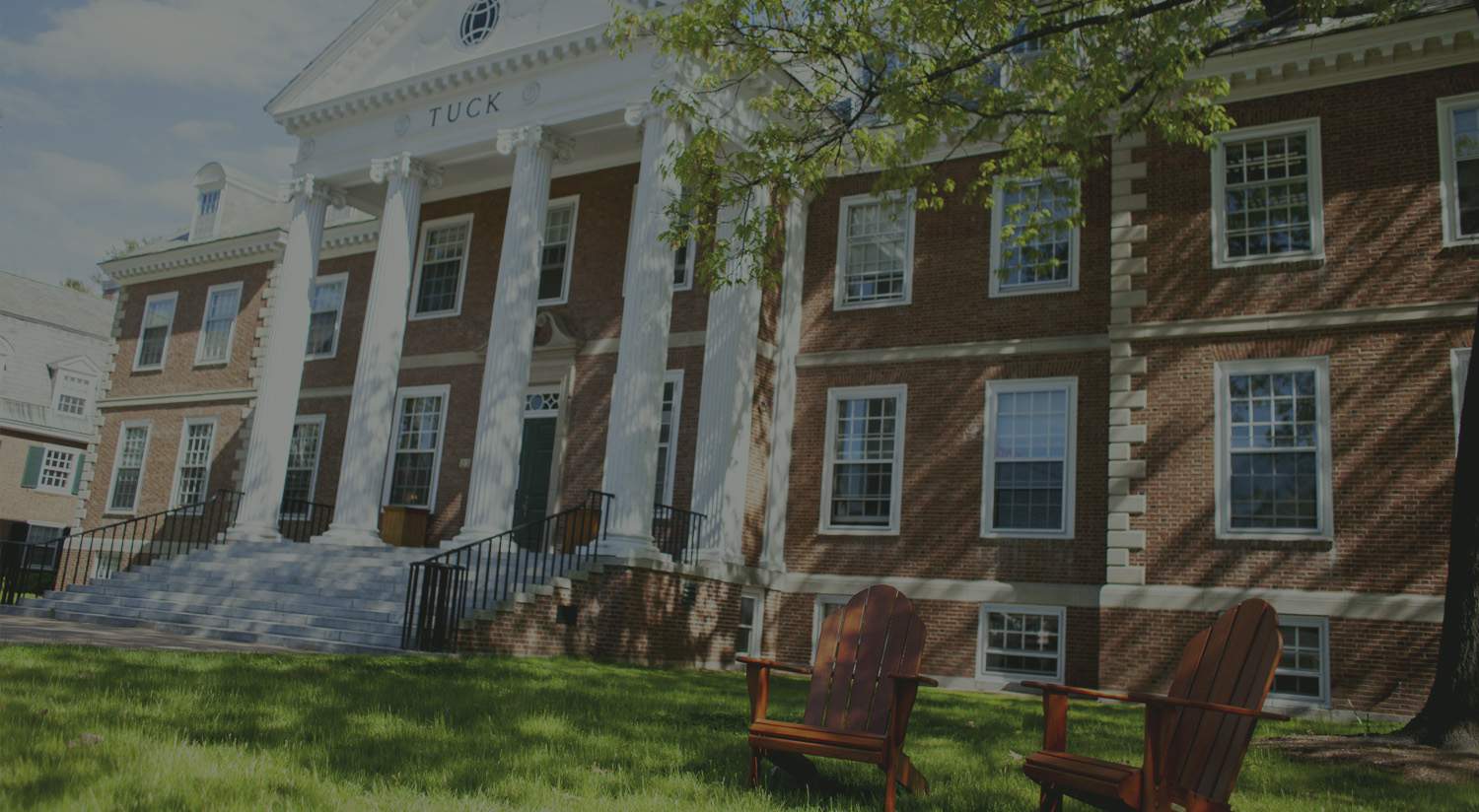
Unmistakably Tuck: Inside Spring Term 2020
Amid a pandemic, Tuck’s first-ever term of remote MBA learning was a great success.
By Kirk Kardashian
Jun 12, 2020

In early May, Professor Ramon Lecuona and the students of Strategy in Emerging Markets were talking about a case on Sherritt International, a Canadian mining company that had invested in Cuba in the 1990s.
In early May, Professor Ramon Lecuona and the students of Strategy in Emerging Markets were talking about a case on Sherritt International, a Canadian mining company that had invested in Cuba in the 1990s. The choice to partner with the Cuban government was not straightforward, and the case centered on the decision-making process of Sherritt’s CEO at the time, Ian Delaney.
After about an hour of discussion, the students noticed that a special guest had joined the class. Ian Delaney appeared on their screens, as he too Zoomed in to the online classroom from his home in Toronto. For the next 25 minutes, students were able to ask the former CEO questions directly and round out the story from the case.
“It was a great conversation,” says Lecuona, who was recently named a recipient of the annual Tuck Teaching Excellence Awards. “We not only got the insights directly from the person who was actually making the decisions, but students got to ask questions to a seasoned manager with years of experience investing in emerging markets.”
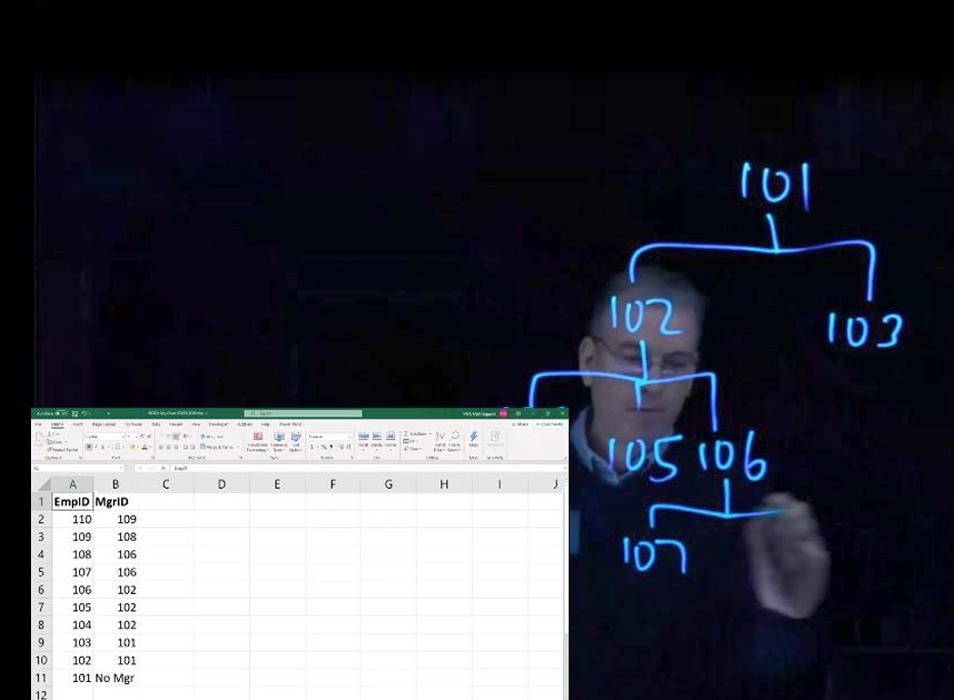
"Seeing the dedication and effort each of our faculty is putting into our remote learning experience is something that makes me even more proud to be a Tuck student, and is something I greatly appreciate,” says Andrés Díaz de Valdés Grebe T’21.
Read more
The COVID-19 pandemic has prevented the Tuck community—and visitors—from congregating on campus, but it has not diminished the personal, connected and transformative learning experience that is Tuck’s hallmark. Through the creative resolve of the students, faculty, staff and alumni, the entirely remote spring term featured hundreds of synchronous and richly interactive classroom sessions, more executive visits and talks from leaders in business and government than ever before, and a wide range of virtual meet-ups and social gatherings.
“I’ve learned at Tuck that nothing is impossible,” reflected Tanushree Podder T’20. “This is an extremely strong community.”
The transition to a virtual learning community happened quickly. During the second week of March, as the magnitude of the public health crisis became evident, Tuck leadership realized that the spring 2020 term would have to be conducted online. The school had less than 14 days to implement an entirely different format for the curricular, co-curricular and career aspects of its renowned MBA experience.
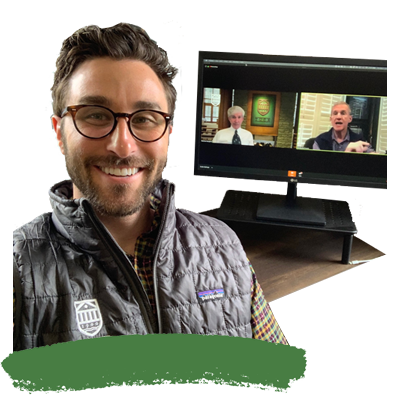
Students had the opportunity this spring to hear from prominent executive speakers like U.S. General and founder of McChrystal Group Stanley McChrystal; Brian Gallagher, president and CEO of United Way; Shannon Gordon T’06, CEO of theBoardlist, and more.
See more
“We started by leveraging the online learning expertise across our community,” explains Joe Hall, senior associate dean for teaching and learning. Since 2011, Tuck has partnered with The Dartmouth Institute for Health Policy and Clinical Practice on the Master of Health Care Delivery Science (MHCDS) program, an intensive and high-touch online degree with short residential periods. Tuck’s MHCDS professors advised the rest of the faculty on the platforms and processes they use for remote teaching, and helped run mock online classes to help work out virtual classroom details.
The school also created new faculty-support roles to allow professors to focus entirely on their teaching during class times. These included IT personnel who were present to help solve technical problems and ensure streaming quality, as well as classroom facilitators, who assisted the faculty with Zoom-related student interactions during the remote sessions. Few other top business schools provided the same level of support in virtual classroom settings.
“The spring term was what we had planned to do all year long,” says Joe Hall, senior associate dean for teaching and learning. “The nuts and bolts changed, but the educational opportunities remained the same.”
Read more
Upon return from spring break, Tuck students were introduced to the Zoom platform and the school established norms for online behavior, setting participation and engagement expectations that were just as high as they were for in-person classes. All classes were delivered live, at their regularly scheduled times, and students were expected to have their computer cameras turned on during class so professors could see their faces. Grading remained as usual.
The students really stepped up. They brought their best selves to class, and that makes a huge difference when you’re teaching because it’s very much a co-creative experience.
“The students really stepped up,” says Brian Tomlin, the senior associate dean for faculty and research, who taught two sections of the required core Operations course during the spring. “They brought their best selves to class, and that makes a huge difference when you’re teaching because it’s very much a co-creative experience.”
That experience was highly interactive. Using Zoom, professors poll their students and get immediate feedback on a question, seeing the percentages that chose one answer over another. There’s a chat function, which allows students to type answers to questions, and then the professor can pick a few students to expand on their answer. Professors can also create breakout rooms, where small groups can meet to discuss a problem, and professors can then visit those rooms. “It really extends and expands upon what we can do in regular, in-person instruction,” says Hall, who taught the other two sections of the Operations core course.
“My call to action to everyone who comes to Tuck is to have agency over their experience and take ownership,” recommends Tuck Student Board President Caroline Wells T’20. “Don’t be afraid to say, ‘This is how I want my experience to look’ and then take the steps to make it happen.”
Read more
Peter Bourgeois T’21 came away from the term impressed with how well the faculty adopted the distance-learning technology. And academically, Bourgeois says he benefited from being at his home workstation when class ended, so he could begin his assignments right away, while the material from class was still fresh in his mind. “Before, I would have lunch with friends, go home, and maybe not start the assignment until eight or nine hours later,” he says. He also found the professors to be just as accessible as ever, spending time with students after class and being available during virtual office hours. Many of the faculty also continued their lunch meet-ups with small groups of students, but remotely. “This was the best learning semester for me,” Bourgeois says.
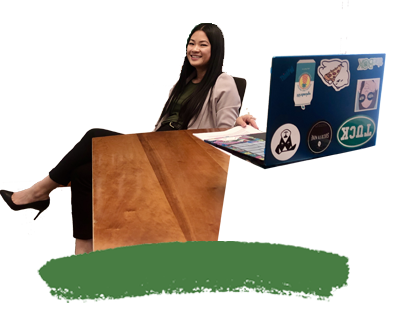
Tuck’s student-organized Virtual AgTech Summit, the world’s largest online conference on agriculture technology, drew over 900 attendees from all over the world. “The summit came at a particularly historic time in human history,” says Kristin Ng T’21 who co-organized the event and offered opening remarks.
Read more
Courses that are traditionally smaller and more experiential thrived in the online setting. One example is Advanced Management Communications, which was taught this spring by Courtney Pierson T’01 and Julie Lang T’93. The course is taught as a communications workshop, with a maximum of 12 students and no lecturing. Each student hones his/her presentation and discussion skills, based on their individual intentions. When one student is presenting, her classmates are acting as either the intended audience or observers who provide feedback. “It’s very hands-on by design,” says Pierson. “That translated to Zoom better than we expected, and we created more structure to make the students’ roles as speakers, listeners and feedback providers clearer.” The students, adds Pierson, were glad they took the course while it was on Zoom, because they learned the skill of presenting remotely, something they all imagined they will be doing frequently even after the pandemic is over.
I’ve learned at Tuck that nothing is impossible. This is an extremely strong community.
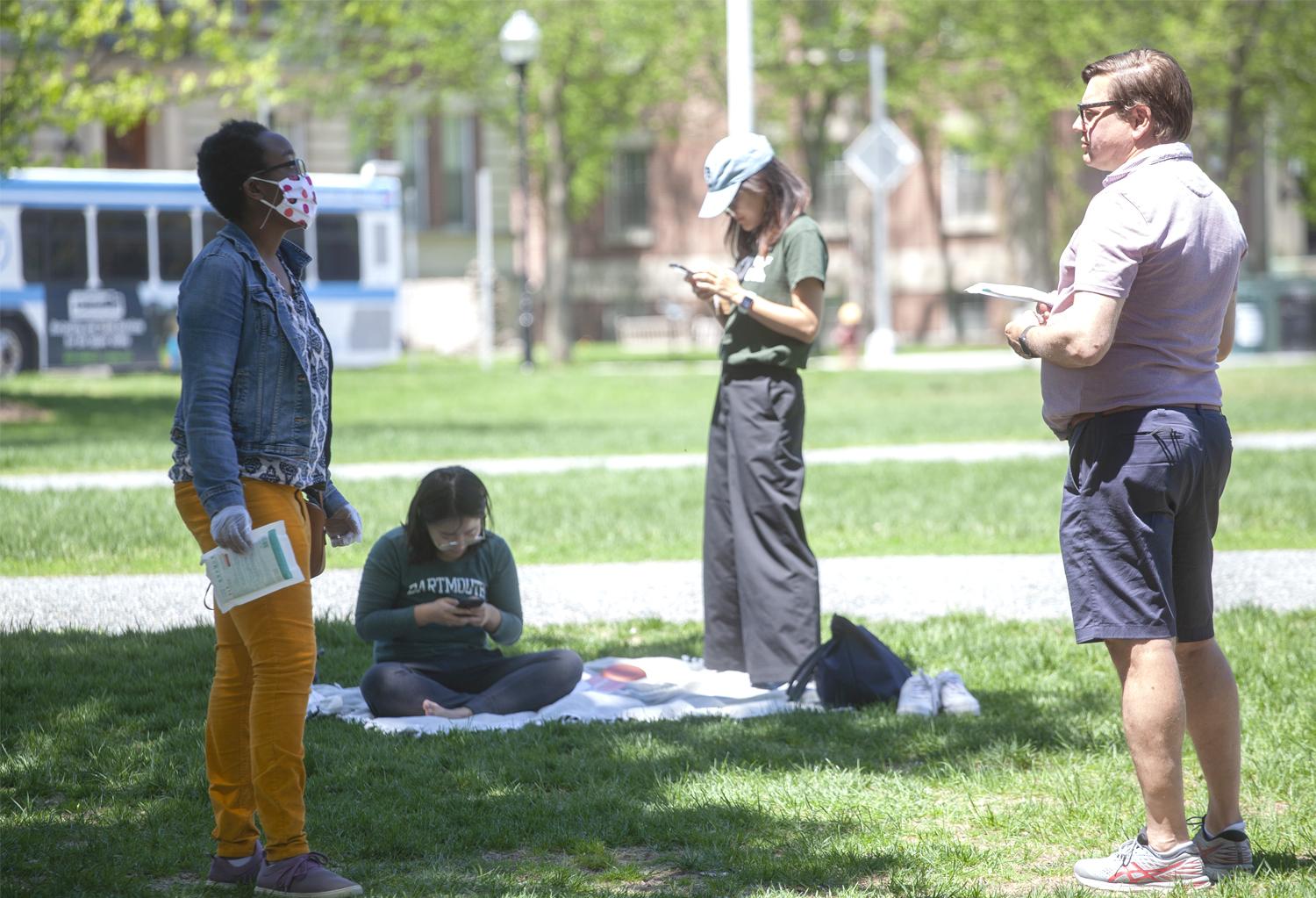
A group of T’20s organized a socially distant meetup to hand-off complimentary medical masks to members of the community.
Read more
The Tuck First-Year Project (FYP) was another experiential course that worked surprisingly well in a remote format. A required first-year course, the First-Year Project challenges students to apply what they’ve learned in the classroom to solve complex, strategic business challenges for clients—ranging from multinationals to nonprofits and early-stage startups. This culminates in a report and presentation to the client.
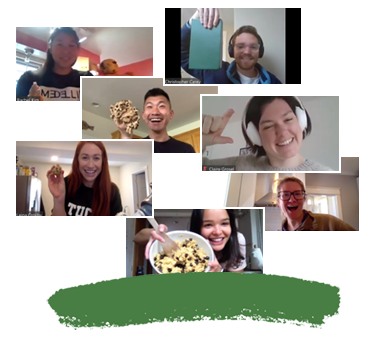
From sewing face masks for health-care workers to organizing virtual cooking classes, the QuaranTuck Initiative kept the Tuck community closely connected during the new virtual world.
Read more
The FYP experiences were as rich and rewarding as ever. Yangming Fei T’21 worked on a project advising a client in the petroleum industry about monetizing a software platform. “Before starting this project, I thought working remotely as a team would substantially impact our efficiency, but it turned out to be quite the opposite,” he says. “We could talk and schedule meetings very easily, and didn’t need to worry about which location to choose. And scheduling interviews with the client was just as easy.” For Madeleine Livingston T’21, who worked on a project about delivering preventative medical care virtually, her experience developing close relationships with her team members “helped refute the preconceived notion that it would be difficult to do rapport-building in a virtual setting,” she says.
Beyond academics, the Tuck community rallied to make sure the social experience outside of the classroom was just as fulfilling. Students began putting out a weekly QuaranTuck newsletter promoting various gatherings, which included TuckTails, trivia nights, scavenger hunts, baking and cooking classes, TikTok challenges, and even a virtual version of the annual MBA World Cup soccer tournament, which took place on PlayStation and Xbox as opposed to campus fields.
“The students jumped at the opportunity to be thoughtful and creative and still have this personal, connected and transformative experience, but doing it differently,” says Sally Jaeger, the associate dean of the MBA Program.
The freedom and ease of the virtual environment opened up opportunities for more compelling talks and interactions with alumni and high-level leaders in business and government. Steve Schwarzman, the chairman, CEO and co-founder of Blackstone, and David Rubenstein, the co-founder and co-executive chairman of The Carlyle Group, visited David Marchick’s class on Managing Stakeholders in Private Equity. The View From the Top speaker series brought in four-star general Stanley McChrystal and Jacqueline Novogratz, the CEO of Acumen. The new weekly Faculty Research Chats featured a diverse array of professors from each business discipline discussing their research and its intersection with the current business world.
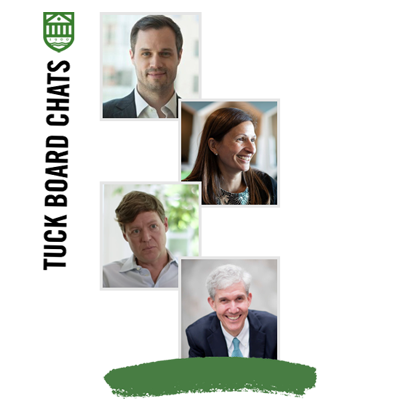
Launched this spring, Tuck Board Chats connect students with influential alumni who are or have been serving on one of Tuck’s advisory boards or councils.
Read more
The school also launched a new series, Tuck Board Chats, connecting students with influential alumni who are or have been serving on one of Tuck’s advisory boards or councils. Jim Esposito T’95, global co-head of the securities division at Goldman Sachs, spoke with students about the pandemic’s impact on global markets and leadership during volatile times. Kevin Demoff D’99, T’06, COO of the Los Angeles Rams and Russell Wolff D’89, T’94, EVP and general manager of ESPN+ engaged in lively conversation with students about the future of the sports industry. Three heads of the MBA Advisory Council, Mike Koester T’99, partner in merchant banking at Goldman Sachs; Leela Srinivasan T’06, CMO at SurveyMonkey; and Errik Anderson T’07, founder and CEO of Ulysses Diversified Holdings, joined students to discuss compassionate leadership.
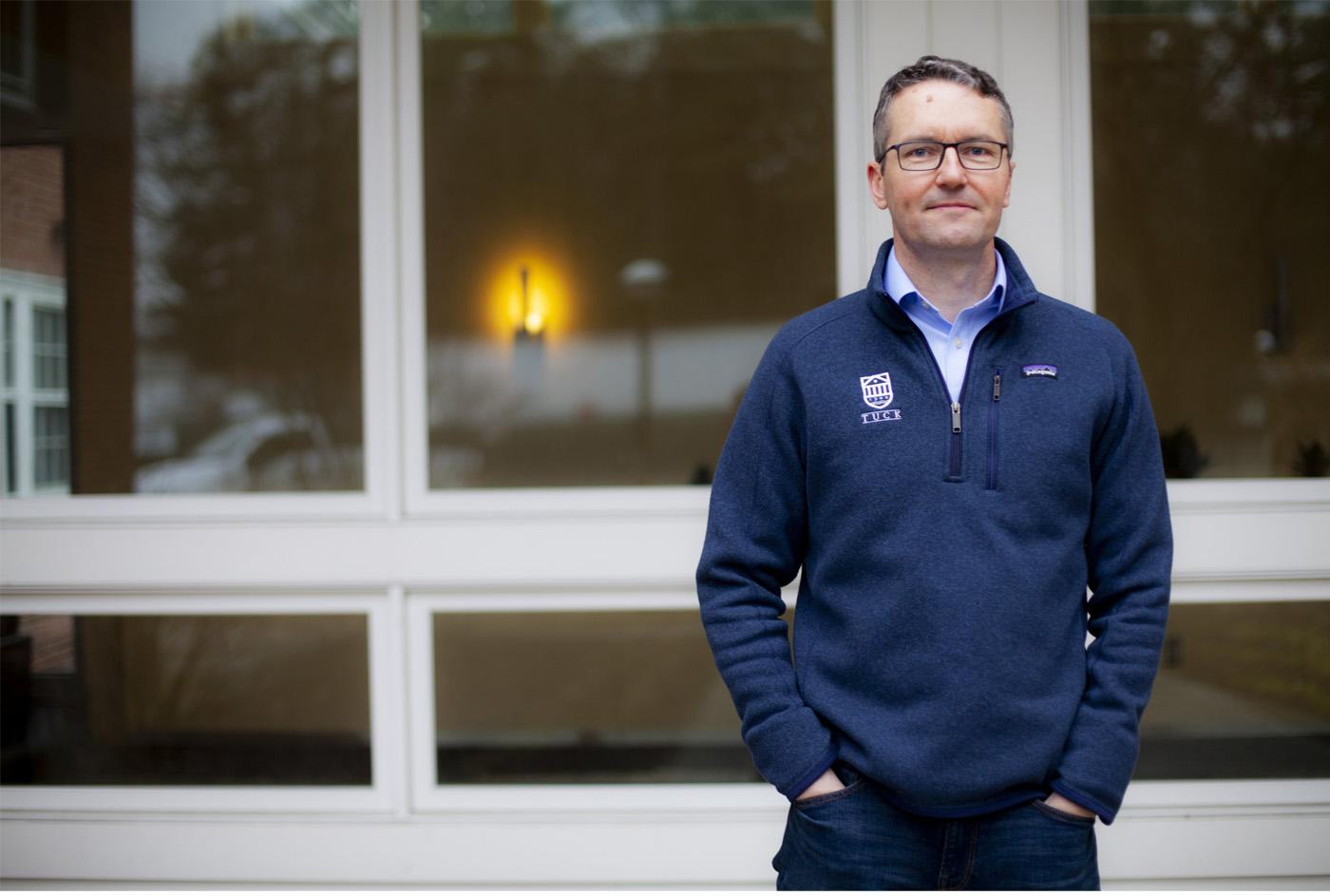
“Every day for the past few weeks, I have received at least one email from an alum with a warm lead to an internship or a job posting,” says Stephen Pidgeon T’07, executive director of career services.
Read more
On the job front, Tuck’s extraordinarily distinguished and loyal network of alumni and corporate partners also proved critical to the success of student career exploration during the spring term. “Every day for the past few weeks, I have received at least one email from an alum with a warm lead to an internship or a job posting,” says Stephen Pidgeon T’07, executive director of career services. By the end of May, more than 99 percent of Tuck first-year students had summer internship offers. As the virtual Investiture celebration for the Class of 2020 approaches, the number of graduating students who have already accepted full-time offers is the highest it has ever been.
“Recruiting lends itself well to virtual interactions,” continues Pidgeon, “Whether it is an office hour or a one-on-one chat over the phone, the process of networking and learning about a company continues quite the same. But the outreach and help from alumni during this pandemic especially has really shown the value of the Tuck network.”
Tuck is what you make of it. Come here ready to contribute to the learning experience of your peers. The difference between in-person and online has not been as great as I thought. You are going to learn just as much, if not more.
Jaeger is confident about the beginning of the 2020-2021 school year, even though it will be different than years past. “The richness of what we’re able to do virtually is phenomenal,” she says. “It helps set us up for the fall, and gives us more possibilities for future programming.” To help first-years merge into the community, this summer the MBA Program is creating buddy groups each composed of three T’21s and three T’22s. And the school will organize virtual gatherings to slowly mix the two classes together early on. “We all miss this in-person community we all love, but at the same time, we’re able to create something that is very similar and, in some ways, better,” says Jaeger.
After making it to the other side of the spring term, rising first-year Peter Bourgeois has some friendly advice for his new Tuck colleagues starting their MBA in August. “Tuck is what you make of it,” he says. “Come here ready to contribute to the learning experience of your peers. The difference between in-person and online has not been as great as I thought. You are going to learn just as much, if not more.”

View From the Top: "Moral Imagination and Leadership for a New World"
Guest: Jacqueline Novogratz, CEO of Acumen
Elective: "Managing Stakeholders in Private Equity" with Professor David Marchick
Guests: Steve Schwarzman, chairman and CEO of The Blackstone Group, and David Rubenstein, co-executive chairman of the Carlyle Group